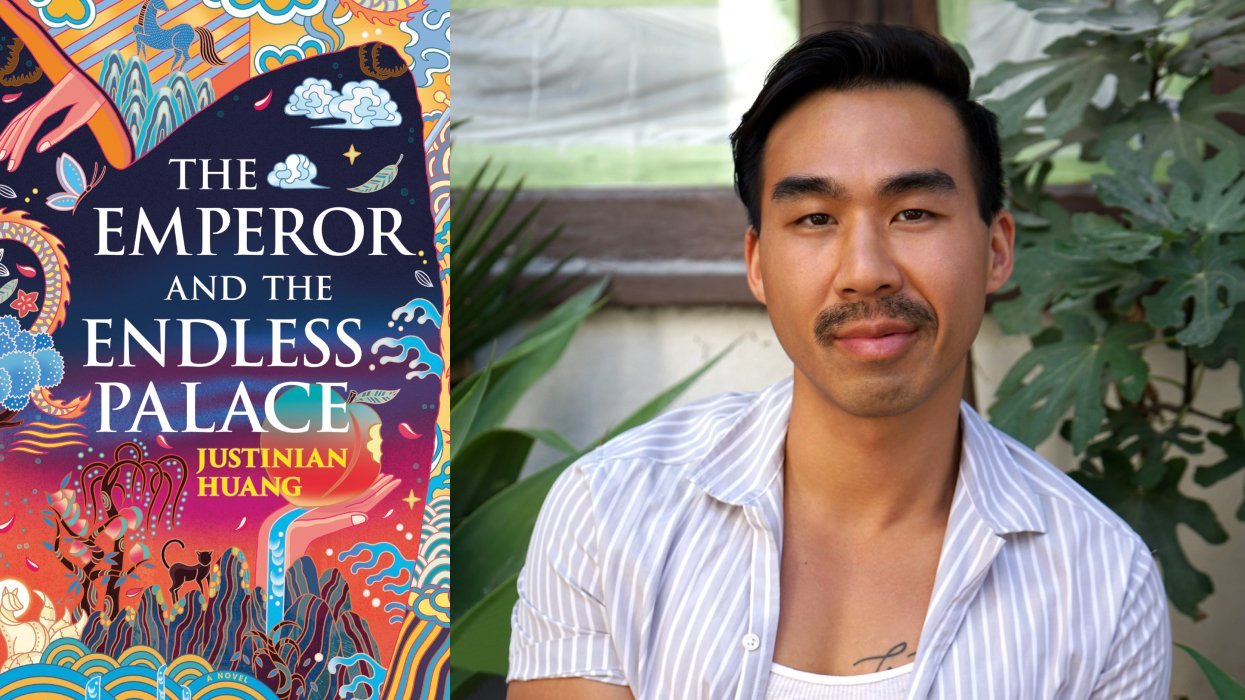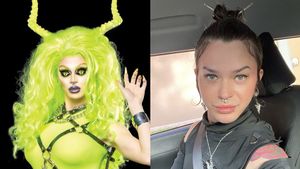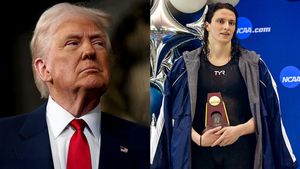Author and creative force Justinian Huang's debut novel is giving queer Asian book lovers the endearing, romantic, and spicy ride of their lives!
Inspired by the real-life love story of Emperor Ai of Han and his male lover Dong Xian, The Emperor and the Endless Palace is a triumph for those who are still don't see enough of themselves in the pages of their favorite romance and fantasy books. And with multiple timelines spanning different centuries, there's a lot of excitement (and sexiness) to keep your turning the page.
"In the year 4 BCE, an ambitious courtier is called upon to seduce the young emperor — but quickly discovers they are both ruled by blood, sex and intrigue," the novel's official description reads. "In 1740, a lonely innkeeper agrees to help a mysterious visitor procure a rare medicine, only to unleash an otherworldly terror instead. And in present-day Los Angeles, a college student meets a beautiful stranger and cannot shake the feeling they’ve met before."
"Across these seemingly unrelated timelines woven together only by the twists and turns of fate, two men are reborn, lifetime after lifetime," it continues. "Within the treacherous walls of an ancient palace and the boundless forests of the Asian wilderness to the heart-pounding cement floors of underground rave scenes, our lovers are inexplicably drawn to each other, constantly tested by the worlds around them. As their many lives intertwine, they begin to realize the power of their undying love — a power that transcends time itself… but one that might consume them both."
Out got the chance to chat with Huang, and he opened up about the importance of queer Asian men getting to read about themselves as the sexy romantic love interest, who is queer literary heroes are, plans for an adaption of
Endless Palace, and how to support queer Asian voices all year long.
Out: How did you first come across the story of the Emperor and Dong Xian? And what specifically about that story made you want to create your own with The Emperor and the Endless Palace?
Justinian Huang: When I was in my early 20s, I was desperately in love with a fellow Asian man, and he told me about this true story one night as I laid my head on his chest after we'd just had amazing sex: Emperor Ai and his male lover Dong Xian were similarly in bed together (albeit 2000 years prior to us), but the Emperor had to take his leave. Dong Xian had fallen asleep, and instead of stirring him awake, the Emperor cut off his own sleeve. To this day, referring to someone as having a 'cut sleeve' in Mandarin is another way of saying they are gay.
As I listened to this boy tell me this love story, I couldn't help but see us two reflected in the image of this Emperor and his lover… queer Asians like me don't have the luxury of seeing ourselves in mainstream media, so it was hard not to draw comparisons, even to this supreme ruler of ancient China. It really felt like Emperor Ai and Dong Xian's tragic tale was the greatest love story never told, and I began to wonder if I could write a novel about them. About a decade later — and many lovers later! — I finally wrote The Emperor and the Endless Palace.
I read that the queer subcultures and the rave/underground scene in Shanghai greatly inspired your work on this book. What were some of your favorite places or things you got to highlight in TEATEP?
I did live in Shanghai from 2015 to 2020, but near the end of my time there, LGBTQ+ communities actually started being suppressed by the powers that be. Fortunately, there are places in Asia of queer acceptance, like my homeland Taiwan which was the first government to legalize gay marriage in the Eastern hemisphere (even before Australia), as well as Thailand. The circuit parties that I've attended in Taipei and Bangkok are unlike anything this American-born Asian kid could have ever imagined, and without giving away too much, The Emperor and the Endless Palace dives headfirst into them!
There's been pushback in visual media (both gay and straight) recently and it feels like new titles are becoming more saccharine and prudish as ever. But TEATEP it is decidedly very spicy and erotic, and it's nice to see a project with Asian characters get that kind of sexy treatment/gaze, since a lot of media consumers still don't see or read enough Asian faces in those kinds of dynamics. Can you talk about making that choice, and getting to make an Asian story with Asian characters who are unabashedly sexy.
We Asian men have been desexualized for way too long. I wanted to write a book that was a celebration of Asian male sexiness, featuring spicy Asians that were sexually exuberant, that desired and pleasured each other, that owned and celebrated their bodies, that were powerful erotic beings. They say to write what you know, and I know sexy Asian men — so I wrote about them!
You can tell you've struck some sort of gatekeeping nerve when you get any sort of double-standard backlash. Because my book is so sexually confident, it's gotten slut-shamed quite a bit by a rather milquetoast segment of Goodreads. But I don't write for boring, basic people. Honestly, I just write what thrills me, and I welcome anyone along for the ride to buckle up too.
As an LA girly, it's cool to see the city also get highlighted. Can you talk about that choice to set the modern timeline of the book in Los Angeles?
LA girlies unite! I was born and raised in Southern California, and I am a proud Angeleno, so I wanted to pay homage to my home. I also feel that the Asian and queer facets of Los Angeles aren't depicted very often, so taking my reader on a romp through our LA would be fun. Plus, I get to set the Griffith Observatory on fire! That was my favorite place to visit as a kid, so I had to serve some major drama there.
 HarperCollins Publishers
HarperCollins Publishers
Who are some of your literary heroes, queer or otherwise?
Well, the authors that come to mind are all queer. James Baldwin, Emily Dickinson, Alice Walker, Tennessee Williams, Oscar Wilde… But to be honest, given my background in film, my biggest heroes are filmmakers: Ang Lee, Park Chan-Wook, Bong Joon Ho, to name a few.
If you had to cast the film adaptation to your book, who are you casting?
Given that we are indeed currently casting an adaptation, I don't think I'm allowed to answer this question!
May is AAPI Heritage Month and June is Pride Month, so queer Asian folks get a lot of things marketed to them during this time of year, but then get paid dust the rest of the year. What do you hope to see change in publishing so that queer Asian artists feel supported all year long?
Yes, it is around this time of year that so many folks tell me there isn't enough queer Asian representation in publishing, to which I say: I'm writing as fast as I can! I'm almost finished with my next book, which is an entirely different genre from The Emperor and the Endless Palace, but is just as twisty and shocking, with plenty of spice, of course.
The best way that publishing can support queer Asian artists is by publishing us. We are not niche. We are humans writing about the human experience. Like intricate origami, we simply have more folds in our identity… and that's something profoundly beautiful and worthy of print.
Order your copy of The Emperor and the Endless Palace from HarperCollins, Amazon, & other booksellers on Huang's official website here. And for more on Huang, make sure to follow him on Instagram, @justinianhuang and @endlesspalace.




 HarperCollins Publishers
HarperCollins Publishers


































































